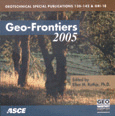Comparison of Measured and Predicted Skin Friction Values for Axially Loaded Drilled Shaft Foundations in Gravelly Soils
Publication: Advances in Deep Foundations
Abstract
Drilled shafts have become the preferred deep foundation element in many arid and semi-arid regions such as the southwest USA because soil conditions are usually unfavorable to driven piles due to coarse gravel and cobbles. In addition, scour depths on the ephemeral river channels are quite large and there is increased confidence in the bearing layer afforded by the drilled shaft construction process. Skin friction predictive equations have been available for determining the contribution of skin friction to the drilled shaft axial load carrying capacity for a number of years. In clays and sands many load tests have been performed. These load test results have served to create and validate the equations used. In the past, only a limited number of load tests have been performed on granular materials with high gravel content. It is presumed that the skin friction factors of gravelly soils would be higher than those for pure sands, because of the increased dilatancy of gravels prior to failure. As the use of drilled shafts increases, more data from gravelly soils has become available from load tests to determine how well the current predictive equations work. This paper focuses on skin friction factors arising from drilled shafts in granular materials with a significant to high gravel content. Fifty six load tests were analyzed to determine the actual skin friction factors for drilled shafts in granular soils. These skin friction factors were compared with the various predictive equations currently employed for design purposes. The results show that the predictive equations are extremely conservative for predicting the skin friction factor in gravelly soil conditions. A new empirical model was developed by back calculating the ratio of horizontal stress to vertical stress which leads to the development of the actual skin friction in the field. This new model produces more or less unbiased estimates of the actual skin friction in the field.
Get full access to this chapter
View all available purchase options and get full access to this chapter.
Information & Authors
Information
Published In
Copyright
© 2005 American Society of Civil Engineers.
History
Published online: May 7, 2012
Authors
Metrics & Citations
Metrics
Citations
Download citation
If you have the appropriate software installed, you can download article citation data to the citation manager of your choice. Simply select your manager software from the list below and click Download.
